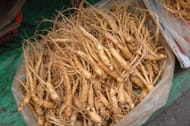The health benefits of red ginseng have recently become common knowledge among people. Ginseng refers to eleven distinct types of a short, slow-growing plant with fleshy roots. The root is white and forked, the stalk is long, and the leaves are oval and green.
This herb has been studied for its potential to treat fatigue and diabetes as well as increase energy and decrease stress and cholesterol.
The plant Korean red ginseng, from which it is derived, grows in Asia. It is also called Asian ginseng, Chinese ginseng, and panax ginseng. Korean red ginseng is not the same as Siberian or American ginseng. Siberian ginseng and American ginseng are distinct plants that serve diverse roles.

More About Red Ginseng
In supplement form, ginseng root is used as a natural treatment. The plant has a five-year growth period before it can be harvested. Due to this, the cost of premium ginseng tends to be quite high.
The term "white ginseng" refers to the root before it has been processed. Meanwhile, red ginseng refers to the steamed and dried variety of the root.
Some of the benefits of red ginseng include increased alertness and the potential to treat or improve lifestyle conditions like diabetes. It is widely used to prevent common colds and lessen the severity of heart disease.

Uses of Red Ginseng
Owing to its several health benefits, red ginseng has been used in traditional Chinese medicine for centuries. Check out the following uses and benefits of Korean ginseng:
- boosts immune system
- improves heart health
- treats diabetes
- increases energy
- decreases stress
A popular story about the plant that herbal medicine practitioners often narrate is that the root resembles a human body. It has shoots for limbs instead of traditional arms and legs.
This resemblance may explain why traditional herbalists use ginseng as a treatment for the whole body. More studies in recent years have confirmed Ginseng's efficacy as a natural treatment option.
Benefits of Red Ginseng
Ginseng has been studied for its ability to help cancer patients. In fact, colorectal cancer prevention may be aided by ginseng. When combined with chemotherapy, ginseng may also improve cancer patients' quality of life.

There is evidence that one of the benefits of red ginseng is that it can inhibit tumor development and even halt the spread of cancer cells. Saponin, a component of ginseng, has been shown to reduce the growth of tumors, and there is some evidence that it can help with memory loss associated with dementia and even boost cardiovascular health.
Although more research is necessary, the preliminary results are encouraging for its potential application in other medical fields.
Ginseng is useful for warding off colds and easing the discomfort of heart disease. Ginseng has also been shown to improve focus and concentration, reduce stress, and increase stamina.
Side Effects of Korean Red Ginseng
Now that you know about the benefits of red ginseng, you must also learn about the common side effects. Most people can take red ginseng safely for short periods of time. There's a chance the plant could have long-term health effects.
Although some people experience negative reactions after taking ginseng, this is not always the case. Sleep disturbances are the most frequently reported adverse effect. Consequences that are less common include:
- headache
- dizziness
- rash
- menstrual issues
- increased heart rate
- high blood pressure
- diarrhea
One of the commonly claimed benefits of red ginseng is that it can help with lifestyle conditions like diabetes, although there is no current research to show this. Although ginseng may have health benefits, it is not meant to replace conventional medicine. Before trying red ginseng as a medication, consult your doctor.
